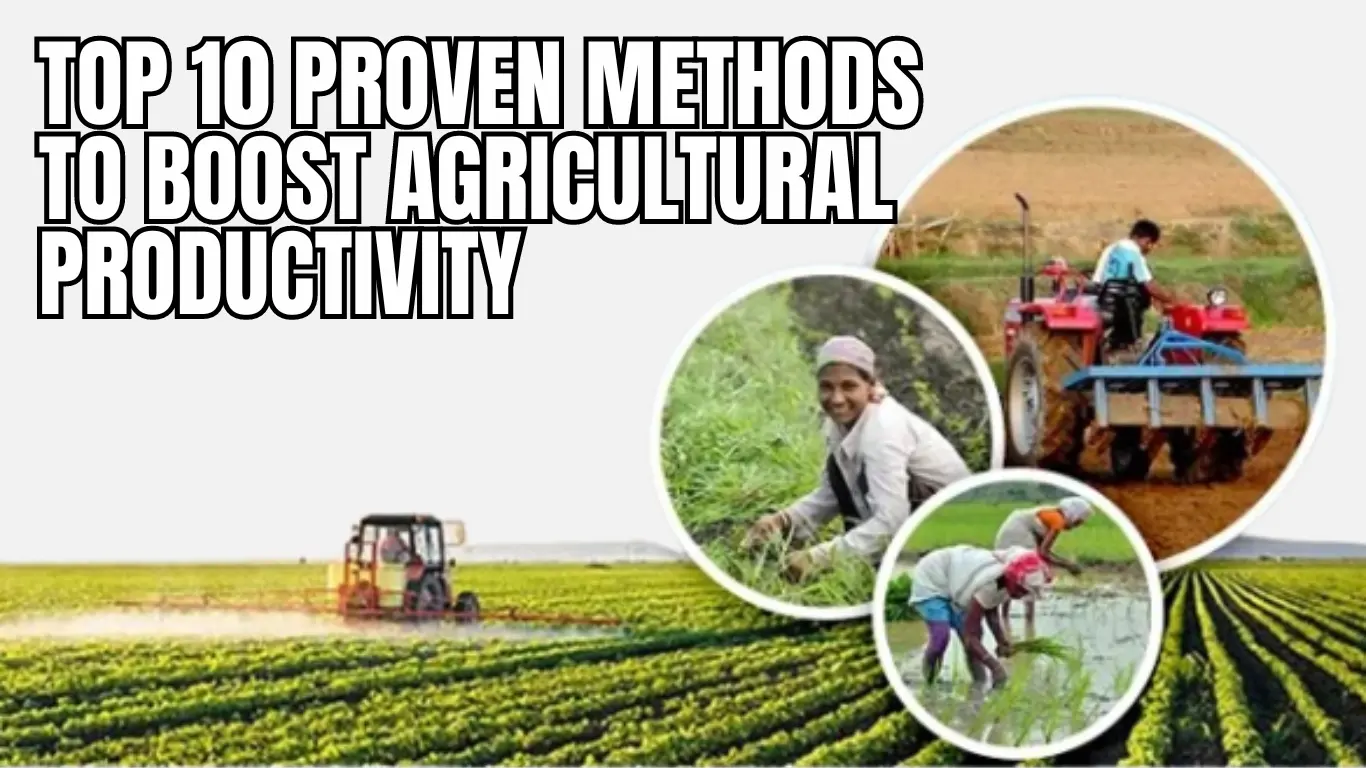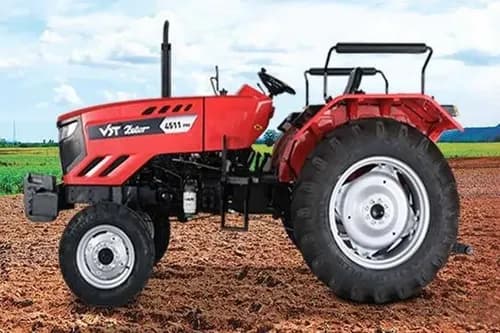Ad
Ad
Ad
Top 10 Proven Methods to Boost Agricultural Productivity

Key Highlights
- Efficient land use through mechanization.
- Interplanting for optimal land utilization.
- Denser crop planting for higher yields.
- Crop diversification for soil health.
- Raised beds improve drainage and yield.
- Advanced irrigation conserves water.
- Heat-tolerant crop varieties.
- Precision nitrogen application.
- Use of certified improved seeds.
- Integrated pest management for crop protection.
More than half of India's population relies on agriculture for their livelihood. Enhancing agricultural productivity is crucial for maximizing food grain production and ensuring sustainable farming practices.
Here are ten effective methods to achieve this goal:
Implementation of Land Reforms: - Improving farmland through mechanization such as tractors, cultivators, and rotavators ensures even and fertile ground that’s suitable for cultivation. This not only enhances the productivity but also makes the field operations more efficient.
Land reforms also include proper land distribution and consolidation. Fragmented landholdings, a common issue in Indian agriculture, hinder efficient farming. Consolidating small plots into larger ones can facilitate the usage of modern machinery and reduce production costs. Proper irrigation infrastructure, soil health management, and the removal of legal barriers to land use can further boost productivity.
Interplanting: - Interplanting involves growing compatible crops together simultaneously. For instance, pulses and oilseeds can be intercropped with sugarcane, optimizing land usage and boosting the overall yield. Careful selection of crops prevents competition and maximizes resource utilization.
This technique also promotes biodiversity, which can enhance ecosystem resilience and reduce pest outbreaks. For example, growing legumes alongside cereals can naturally enrich the soil with nitrogen, reducing the need for synthetic fertilizers. Proper planning and knowledge about crop compatibility are essential for successful interplanting.
Densely Planting Crops: - Increasing the planting density by reducing the spacing between plants optimizes land usage. This method prevents the wastage of agricultural space, particularly beneficial for high-value crops like vegetables, where closer planting can significantly boost output.
However, dense planting requires careful management of soil nutrients and water to prevent competition among plants. Proper spacing ensures that plants receive adequate sunlight, air circulation, and nutrients. Advanced planting techniques and the use of high-yielding seed varieties can help achieve the best results.
Crop Diversification: - Growing a variety of crops in the same field improves soil health and productivity. Combining grains with pulses or oilseeds with fruits and vegetables not only enhances nutritional diversity but also reduces pest and disease risks associated with monoculture.
Crop diversification can also provide financial stability to farmers. By growing multiple crops, farmers can mitigate the risk of crop failure due to adverse weather conditions or market fluctuations. Diversified farming systems can support soil conservation practices and promote sustainable land use.
Raised Bed Preparation: - Transitioning from traditional row planting to raised beds allows for denser planting and efficient use of space. This method improves soil structure, facilitates better drainage, and enhances nutrient availability, thereby increasing crop productivity.
Raised beds can also help in managing soil erosion and retaining moisture, which is particularly beneficial in regions with irregular rainfall. By creating a more controlled growing environment, raised beds can enhance root development and plant health, leading to higher yields.
Effective Water Management: - Optimizing water usage through advanced irrigation techniques such as sprinklers and drip systems conserves water and enhances productivity. These methods reduce water wastage, improve soil moisture retention, and ensure crops receive adequate hydration throughout their growth cycle.
In addition to modern irrigation systems, water harvesting techniques like building ponds and check dams can ensure a reliable water supply. Efficient water management practices help maintain soil health and can prevent issues like waterlogging or salinity, which negatively impact crop growth.
Also Read: Big Subsidy on Building Ponds and Wells: Farmers Can Benefit
Cultivating Heat-Tolerant Varieties: - Selecting crop varieties resilient to high temperatures ensures stable yields even during prolonged heat spells. Adopting heat-tolerant seeds enhances crop resilience to climate change impacts, maintaining productivity in increasingly warmer climates.
Research and development in crop genetics play a crucial role in developing these varieties. Farmers can collaborate with agricultural scientists to access the latest seed varieties that are not only heat-tolerant but also resistant to diseases and pests. Education and training on climate-smart agriculture practices are essential for farmers to adapt to changing conditions.
Utilizing Nitrogen Efficiently: - Nitrogen is essential for plant growth, and efficient application methods ensure optimal absorption by crops. Using nitrogen fertilizers judiciously enhances plant vigor and productivity, contributing to higher crop yields.
Overuse of nitrogen fertilizers can lead to environmental issues such as water pollution and greenhouse gas emissions. Therefore, integrated nutrient management practices that combine organic and inorganic sources of nitrogen are recommended. Soil testing and monitoring can help in applying the right amount of nitrogen at the right time, maximizing efficiency.
Employing Certified Improved Seeds: - High-quality seeds are fundamental for robust crop production. Certified improved seeds ensure genetic purity and superior traits, leading to enhanced crop uniformity and higher yields. Investing in quality seeds is crucial for maximizing agricultural output.
Access to improved seeds can be facilitated through government schemes, cooperatives, and seed banks. Farmers should be educated on the benefits of using certified seeds and trained in proper seed storage and handling techniques. Developing local seed production and distribution networks can ensure that high-quality seeds are available to all farmers.
Integrated Pest Management: - Implementing integrated pest management (IPM) strategies reduces crop losses due to pests and diseases. By combining biological, cultural, and chemical control methods judiciously, farmers can protect crops effectively while minimizing environmental impact.
IPM practices include crop rotation, the use of pest-resistant varieties, biological control agents like beneficial insects, and judicious use of chemical pesticides. Farmers should be trained in recognizing pest infestations early and applying appropriate control measures. Government and extension services can support IPM adoption through training programs and subsidies for biocontrol agents.
Additional Methods to Enhance Agricultural Productivity
Soil Health Management
Maintaining healthy soil is the foundation of productive agriculture. Practices such as crop rotation, cover cropping, and the use of organic fertilizers can improve soil fertility and structure. Soil testing and nutrient management plans tailored to specific crop needs can optimize input use and enhance yields.
Adoption of Technology
Embracing modern technology can revolutionize farming practices. Precision agriculture tools, such as GPS-guided equipment and drones, can improve efficiency and reduce input costs. Mobile applications and digital platforms can provide farmers with real-time information on weather, market prices, and best practices.
Farmer Education and Training
Continuous education and training are vital for farmers to stay updated with the latest advancements in agriculture. Extension services, farmer field schools, and community-based training programs can equip farmers with the knowledge and skills needed to adopt innovative practices and improve productivity.
Sustainable Farming Practices
Promoting sustainable farming practices such as conservation tillage, agroforestry, and organic farming can enhance long-term productivity and environmental health. These practices reduce dependence on chemical inputs, conserve natural resources, and promote biodiversity.
Access to Credit and Insurance
Financial stability is crucial for farmers to invest in productivity-enhancing technologies and inputs. Access to affordable credit and insurance schemes can mitigate the risks associated with farming and provide the necessary capital for improvements.
Market Access and Infrastructure
Improving market access and infrastructure can ensure that farmers receive fair prices for their produce. Developing efficient supply chains, storage facilities, and transportation networks can reduce post-harvest losses and increase profitability.
Also Read: Farmer's Guide to Controlling Pokka Disease in Sugarcane
CMV360 Says
Enhancing agricultural productivity is not only essential for food security but also for sustainable rural development. By adopting these ten methods ranging from efficient land use to advanced crop management practices farmers can significantly increase their yields while ensuring long-term soil fertility and environmental sustainability. Embracing innovation and modern agricultural techniques is key to meeting the growing demands of a burgeoning population and changing climatic conditions.
Investing in agricultural research, extension services, and infrastructure development can create an enabling environment for farmers to thrive. Collaborative efforts between government, private sector, and farming communities are essential to drive agricultural transformation and achieve sustainable development goals.
Features & Articles
Top 10 Swaraj Tractors in Rajasthan - Best Models for Efficient Farming
Explore the top 10 Swaraj tractors in Rajasthan, known for their power, efficiency, and suitability for diverse farming needs....
04-Sep-24 11:19 AM
Read Full NewsTop 5 Tips for Purchasing a Compact Tractor: A Guide for Beginners
A compact tractor is a versatile, powerful machine designed for small to medium-sized farming, landscaping, and maintenance tasks....
30-Aug-24 09:21 AM
Read Full NewsCarbon Farming in India: Sustainable Agriculture for Climate Change Mitigation and Soil Health
Carbon farming in India enhances soil health, mitigates climate change, and boosts farmer income through sustainable agricultural practices....
29-Aug-24 09:01 AM
Read Full NewsTop 7 Popular 55-60 HP Tractors in India: Detailed Specs & Pricing Overview
Top 7 popular 55-60 HP tractors in India for farming tasks, known for performance, efficiency, and advanced features....
28-Aug-24 10:32 AM
Read Full NewsTop 10 Fuel-Efficient Tractors in India 2024
This article covers the top 10 fuel-efficient tractors in India for 2024, focusing on their mileage, features, and performance....
26-Aug-24 10:43 AM
Read Full NewsDragon Fruit Cultivation in India: Profitable Farming with Health Benefits
Dragon fruit farming in India is growing rapidly, offering high profitability, minimal water needs, and numerous health benefits....
22-Aug-24 07:24 AM
Read Full NewsAd
Ad
As featured on:


Registered Office Address
Delente Technologies Pvt. Ltd.
M3M Cosmopolitan, 12th Cosmopolitan,
Golf Course Ext Rd, Sector 66, Gurugram, Haryana
pincode - 122002

























